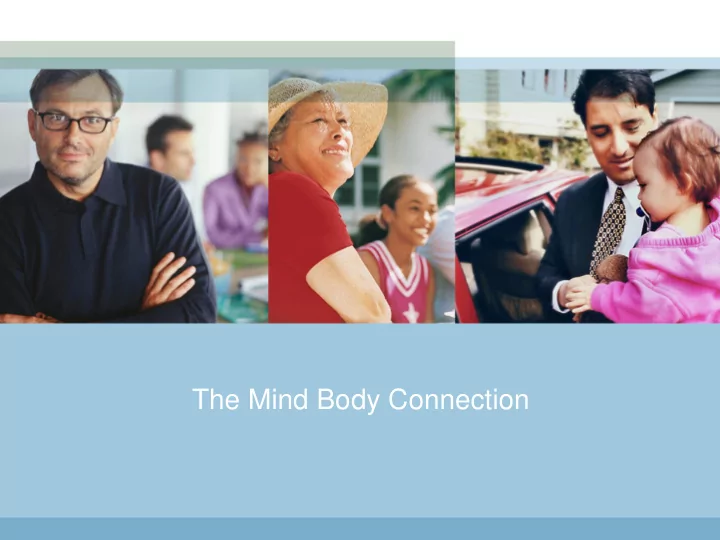

The Mind Body Connection
Presenter Larry Waxman, MA, LPC Larry Waxman is a Licensed Professional Counselor practicing in Raleigh, North Carolina and has been practicing counseling for the last 15 years. He completed his undergraduate degree at Bowling Green State University in Ohio and his master’s degree at John F. Kennedy University in California. He holds a master’s degree in counseling psychology with an emphasis on holistic studies. While completing his master’s degree he learned extensively about the mind/body connection. Larry specializes in the mind body connection and emphasizes the importance of this work in his practice with others utilizing relaxation techniques, meditation, mindfulness, and grounding exercises. During his spare time, Larry enjoys spending quality time with his family and playing and watching sports. While living in California, he played semi-professional baseball. He is also an avid reef keeper and has a saltwater coral reef aquarium.
Reflective Activity
Learning Objectives • Identify the connections between mind and body • Practice the Relaxation Response • Identify how to recognize and manage stressful situations • Recognize the benefits of relaxing your mind and body
Survey What people think and believe can affect their health. A. I agree with this statement. B. I disagree with this statement. C. I am unsure.
The Mind-Body Connection • What people think and believe can affect their health • Relaxation and stress management techniques help to maintain a calm state during stressful situations Mind Body
How Thoughts Affect Well-Being • Psychologists, including Aaron Beck and Albert Ellis, suggest that thoughts have a direct connection to your state of mind • If you change your thinking , you can change your feelings and experience of stress • Changing your emotional response may then have a subsequently positive effect on your physical health
Cerebral Functions: Thinking and Feeling
Effects of an Amygdala Attack • Cognitive thinking stops. • Impulsive feelings override rationality. • Worry, anxiety, panic, frustration, and anger are experienced. • Knee-jerk reactions are triggered. • The person “flies off the handle.”
Negative Impact of Stress on the Body Heart rate, blood Body releases pressure, and Stress hormones breathing increase
Positive Impact of Thoughts on the Brain Natural painkiller Thoughts, Brain produces and immune feelings, and endorphins and system expectations gamma globulin strengthener
Benefits of Managing the Mind-Body Connection • Decreases wear and tear on the body • Decreases anxiety and pain • Improves recovery time when recuperating • Strengthens the immune system • Improves self-control when handling stressful situations
Benefits of Knowing About the Mind-Body Connection • Empowers you to embrace the positive responses • Reduces the effect of negative responses • Helps you recognize your own signs and symptoms • Helps you identify when you need to take action • Leads to better understanding of your stressors and ways to manage them
The Relaxation Response • Developed by Dr. Herbert Benson • Two step process: 1. Repetition of a word, sound, or phrase 2. Focus on the repetition as other everyday thoughts come to mind
Benefits of the Relaxation Response Slows down breathing and the heart beat Reduces blood pressure Enhances resiliency when practiced regularly
Breathing Exercise • Begin with regular breathing • Focus on your breath • Observe inhalation and exhalation • Inhale for four counts • Hold for seven counts • Exhale for eight counts • Breathe normally
Benefits of Using Breathing Exercises • Shifts focus from outside to inside • Controls stressful emotions and anxiety • Increases energy and awareness • Harmonizes nervous system • Diverts attention to a safe place • Centers the mind and quiets mental chatter
Additional Calming Exercises • Progressive muscle relaxation • Guided imagery • Spiritual practices (e.g., centering prayer, meditation) • Music and art therapy
Survey Which of these practices are you most likely to try? A. Relaxation Response B. Breathing exercise C. Progressive muscle relaxation D. Guided imagery E. Spiritual practices F. Music or art therapy
Useful Strategies for Dealing With Stressors • Consider how your perceptions influence your responses • Recognize that adaptability to change is personally beneficial • Openly discuss your feelings with loved ones and/or a counselor • Stay physically active • Seek medical advice about medication options • Hold onto your sense of humor
Thank You Questions?
Works Cited Benson, H. (n.d.). The Relaxation Response . Retrieved March 8, 2016, from http://www.relaxationresponse.org Cleveland Clinic. (n.d.). Mind Body Exercises . Retrieved March 8, 2016, from http://my.clevelandclinic.org/services/heart/prevention/emotional-health/stress-relaxation/mind-body- exercises Martin, S. (2008). The Power of the Relaxation Response . Retrieved March 8, 2016, from http://www.apa.org/monitor/2008/10/relaxation.aspx Michigan Psychological Association. (n.d.). Mind-Body Health Connection . Retrieved March 8, 2016, from http://www.michiganpsychologicalassociation.org/mindbody_health_connection.php Thompson, H. (n.d.). How Stress Impacts Emotional Intelligence and Leader Performance . Retrieved March 8, 2016, from http://www.hpsys.com/Articles/Stress,%20Emotional%20Intelligence%20and%20Leader%20Perform ance.html WebMD. (2014, November 14). Mind-Body Wellness – Topic Overview . Retrieved March 8, 2016, from http://www.webmd.com/mental-health/tc/mental-health-problems-and-mind-body-wellness-overview Weil, A. (n.d.). Breathing: Three Exercises . Retrieved March 8, 2016, from http://www.drweil.com/drw/u/ART00521/three-breathing-exercises.html
Recommend
More recommend